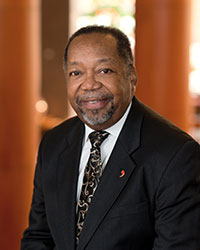Commentary: The Next Chapter in the Struggle for Racial Justice
 Is it the straw that broke the camel’s back or the spark that ignited a forest fire? Any way you look at it, the events of August 9 in Ferguson, Mo., awakened many Americans to a reality too well known in communities of color throughout the nation. From New York City to Los Angeles, Cleveland, Cincinnati and—just this past weekend—Milwaukee, the story repeats itself: unarmed African-American male shot to death by police officer.
Is it the straw that broke the camel’s back or the spark that ignited a forest fire? Any way you look at it, the events of August 9 in Ferguson, Mo., awakened many Americans to a reality too well known in communities of color throughout the nation. From New York City to Los Angeles, Cleveland, Cincinnati and—just this past weekend—Milwaukee, the story repeats itself: unarmed African-American male shot to death by police officer.
This is an issue that warrants further and even continuous attention, because it is a widespread malady. Not only the shooting death, but what usually rises to the surface is years and years of concern and resentment about and toward the police. A recent New York Times article cited that in the St. Louis region alone, Ferguson was only one of several municipalities where the justice department found clear evidence of racist policies and practices targeted at African Americans. In this article, titled Ferguson Became the Symbol, but Bias Knows No Border, Vanita Gupta, the Justice Department’s top civil rights prosecutor, makes the point, saying, “Ferguson is one dot in the state, and there are many municipalities in the region engaged in the same practices a mile away.”
Just as the 50th anniversary of the March from Selma to Montgomery commemorates the culmination of just a single chapter in what has been an ongoing struggle for racial justice and equality, we may one day look back on Ferguson as the beginning of another chapter in that struggle. In 1964, the concern was about desegregation and the basic right to vote. Police brutality and abuse of force was a reality then, but voting was the priority. So only now, after many years and all too many incidents of unarmed African Americans being gunned down by police officers under questionable circumstances, is the behavior and accountability of these public servants the focus of advocacy for change.
In the 50 years since Selma, many things have changed. One of the changes that is a direct result of the Voting Rights Act is that there are many more African-American elected officials serving in public office. We can celebrate these changes and accomplishments, but only as steps toward the ultimate goal – equality in all facets of American life, including and especially our systems of law enforcement and justice.
Since Selma, our understanding of racial justice has evolved as well. Racial justice is about equal justice for all Americans. We have need to emphasize all, without neglecting the historic experience and particular concerns of any racial or ethnic group. It is about equal treatment under the law for African Americans for sure, but it is also about equal treatment in law enforcement and the justice system for Native Americans, Hispanic Americans, Asian Americans, Arab Americans and Euro Americans.
It is important to note that this is a concern for all and that we cannot continue to live under the illusion that racism and racial injustice are problems for African Americans or other racial ethnic groups to contend with exclusively. In truth, much of the needed change has to do with the attitudes and behaviors of Euro Americans.
The march from Selma to Montgomery brought together people of all races and religions in the struggle for justice. This new chapter requires that all people of good will, people who envision an America where our values and our realities are aligned, take up the cause.
The United States of America is becoming a very diverse society, probably the most diverse nation in the world. It is in the best interest of all that we figure this one out and do it together.
The Rev. Geoffrey A. Black is General Minister and President of the United Church of Christ.
View this and other columns on the UCC’s Witness for Justice page.
Donate to support Justice and Witness Ministries.
Click here to download the bulletin insert.
Related News
A Moment of Silence
The weekend news was alarming. Two students shot and killed with 9 injured at Brown University...
Read MoreIn hope-filled worship service, UCC and United Church of Canada celebrate full communion past and future
On Saturday, Dec. 13, many from the United Church of Christ (UCC) and the United Church of...
Read More‘A Gift of God to the World:’ Christmas greetings from the General Minister and President
As Christmas quickly approaches, UCC General Minister and President/CEO the Rev. Karen Georgia...
Read More


